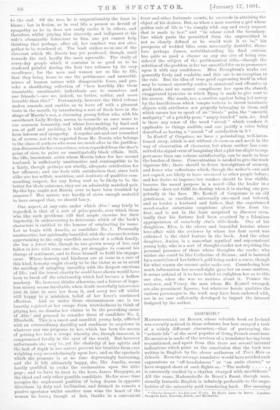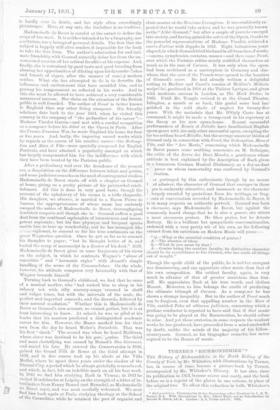60IINOD. * MADEMOISELLE DE BOVET, whose valuable book on Ireland was
recently noticed in these columns, has here essayed a task of a widely different character,—that of portraying the " artistic life " of the most popular of living French musicians. No mention is made of the services of a translator having been requisitioned, and apart from this there are several internal indications which point to the conclusion that the book was written in English by the clever authoress of Trois Moja en Irlande. Even the average translatof would have avoided such expressions as " off-handisbness " or " an • antic chorus," or
have stopped short of such flights as " The melody is amorously cradled by a'rhythm charged with morbidezza." All the same, Mademoiselle de Bovet's fluent though occa- sionally fantastic English is infinitely preferable to the angu- larities of the miserably paid translating hack. Her meaning
* Ch111'1014 C lonnod : his Lifo and Works, By Mario Anna do Bova. London : Sampson Low, Marston, Searle, and Rivington.
is hardly ever in doubt, and her style often exceedingly picturesque. Here, at any rate, the traduttore is no traditore.
Mademoiselle do Bovet is careful at the outset to define the scope of her work. It is neither intended to be a biography, nor
a criticism, nor a farrago of personal details. The fact that the subject is happily still alive renders it impossible for the book to take the first form. The author's admiration for and inti- mate friendship with Gounod naturally debar her from the un- restrained exercise of her critical faculties at his expense. And, finally, she is restrained by good taste and good breeding from abusing her opportunities of dilating upon his favourite Gashes and brands of cigars, after the manner of sundey modern scribes. What she has attempted to do is to describe the influences and environment that have moulded him, and to portray his temperament as reflected in his works. And in this she must be allowed to have achieved a very considerable measure of success. Her claim on the attention of the British public is well founded. The author of Faust is better known ir. England than any other living composer. His friendly relations date back to the year 1851, when he visited this country in the company of " the godmother of his career "- Madame Viardot Garcia—and met with a cordial recognition as a composer before his debut at the Opera in Paris. After the Franco-Prussian War, he made England his home for four or five years. And, lastly, the imposing sacred works which be regards as the crown of his creative career—the Redemp- tion and Mors et Vita—were specially composed for English Festivals, and have attained a popularity amongst us which has largely compensated him for the indifference with which they have been treated by the Parisian public.
After a preliminary wail over the decadence of the present era,, a disquisition on the difference between talent and genius, and some judicious remarks on the need of contrapuntal studies, Mademoiselle de Bovet starts off with a chapter on Gounod at home, giving us a pretty picture of his patriarchal estab- lishment. All this is done in very good taste, though the account of the upholstery of his rooms is a trifle rhapsodic. His daughter, we observe, is married to a Baron Pierre de Lassus, the appropriateness of whose name has curiously escaped the notice of Mademoiselle de Bovet, thoroughgoing laudatrice temporis acti though she is., Gounod suffers a good deal from the continual onslaughts of interviewers and incom- petent aspirants ; but his fine physique and buoyant spirits enable him to bear up wonderfully, and he has managed, like ; ' aiplomat, to conceal so far his true sentiments on the great Wagnerian question. Once he got so far as to commit his thoughts to paper; "but he thought better of it, and buried the scrap of manuscript in a drawer of his desk." Still, Mademoiselle de Bovet gives us some fragments of his views on the subject, in which he contrasts Wagner's "abuse of sonorities " and " harmonic orgies" with Mozart's simple handling of the scene of the Commendatore. On the whole, however, JAB attitude compares very favourably with that of Wagner towards himself.
Turning back to Gounod's childhood, we find that be came of a musical mother, who "had rocked him to sleep in his infancy not with silly nursery-songs ‘-erooned in shrill and vulgar tones, but with the intervals of the scale, the perfect and imperfect concords, and the discords, followed by their natural resolution." Whether this is Mademoiselle de Bovet or Gounod's own account, we cannot gather, but it is at least interesting to know. At school, he was eo g6od at his books that his masters predicted a distinguished academic career for him. However, the Muses marked him for their own from the day he heard Weber's Freischillz. That was his first "shock." The second was when he heard Malibran, whose sister was destined oto be his goot. genius. The third and most electrifying was caused by Mozart's Don Giovanni, and sealed his fate. He entered the Conservatoire in 1836, gained the Grand erix de Rome at the third attempt in 1839, and in due course took up his abode at the Villa Medici, where he spent three years under the shadow of the Eternal City, a period which he always gratefully remembered, and which, in fact, left an indelible mark on all his best work. In 1842 we find him studying Bach in Vienna ; in 1843 he visited Mendelssohn at Leipzig on the strength of a letter of in- troduction from Fanny Hensel (not Henschel, as Mademoiselle de Bovet says), and was most cordially welcomed. We next find him back again at Paris, studying theology at the School of the Carmelites, while he retained the post of organist and
choir-master at the Missions Etra.neires. It was confidently ex- pected that he would take orders, and be was generilly known
as the "Abbe Gounod;" but after a couple of years he emerged into society, and having gained the entrée of the Opera, thanks to the powerful representations of Madame Viardot, achieved a succCs d'estime with Sappho in 1851. Eight industrious years elapsed, in which Gounod tried his hand in all branches of music,. —operas, symphonies, cantatas, masses—and then came Faust, over which. the Parisian critics nearly stultified themselves as much as in the case of Carmen. It was only when the opera had been acclaimed as a masterpiece in Germany and else- where, that the ears of the French were opened to the beauties of Gounod's score. He had already written a delightful setting to Barbier and Carre's version of Moliere's Medecin malgre lui, produced in 1858 at the Theatre Lyrique, and given with moderate success in London, as The Mock Doctor, in 1865. Until Mr. Temple revived it at the Grand Theatre, Islington, a month or so back, this genial score had lan-. guished in the cold shade of neglect for twenty-five. years. With the materials that Mr. D'Oyly Carte has at command, it might be made a trump-card in his repertory at the Savoy or his new opera-house. Recent successful performances of Romeo at Juliette have familiarised English opera-goers with his only other successful opera. excepting the far too seldom heard .111irella ; but the average amateur thinks of Gounod only in connection with Faust, the Redemption, .M-ors et Vita, and the "Ave Maria," concerning which Mademoiselle de Bovet passes some scathing comments.on M. Bellaigue, the critic of the Revue des Deux Mondes, a gentleman whose attitude is best explained by the description of Bach given ir a. humorous German Musical Dictionary, as a dry-as-dust c poser on whom immortality was conferred by Gounod's r
is portrayed by this enthusiastic though by no means 1 ad admirer, the character of Gounod that emerges in these
gee is eminently attractive, and inasmuch as the character i largely revealed by quotations from his writings, or frag- i tints of conversation recorded by Mademoiselle de Bovet, it is in many respects an authentic portrait. Gounod was born a channettr, says Mademoiselle de Beret, but against the commonly beard charge that he is also a poseur, she utters a most strenuous protest. He likes praise, but he detests flattery. He is a brilliant but sympathetic conversationalist, endowed with a very pretty wit of his own, as the following extract from his catechism on Modern Music will prove :- " Q.—What is the essential condition of genius ? A.—The absence of ideas.
Q.—What do you mean by that ?
A.—Genius being the creative faculty, its distinctive character should be its resemblance to the Creator, who has made all things out of nought,"
Though the spoilt child of the public, he is neither arrogant nor domineering, and can appreciate other music than that of his own composition. His critical faculty, again, is very much in advance of that of greater musicians than him- self. He appreciates Bach at his true worth, and idolises Mozart. Moreover, to him belongs the credit of predicting the ultimate triumph of Carmen. As a composer he has shown a strange inequality. But to the author of Faust much can be forgiven, even that appalling number in the Mors at Vita, entitled Tuba' ad ultimum judicium, concerning which a profane conductor is reported to have said that if that music. was going to be played at the Resurrection, he should refuse to arise. And yet these oratorios, in some respects the weakest works he has produced, have proceeded from a mind unclouded by doubt, unlike the minds of the majority of his fellow countrymen. Gounod, as his biographer remarks, has never aspired to be the Renan of music.







































 Previous page
Previous page